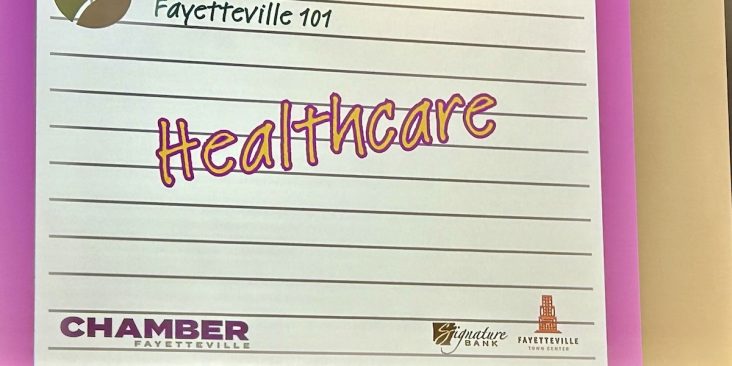Medical reimbursement rates, physician recruitment a challenge in Northwest Arkansas
by September 12, 2024 10:22 am 719 views

Arkansas is at the bottom of the barrel for Medicaid, commercial insurance, and self-insured employer reimbursement rates paid to healthcare providers, according to Larry Shackelford, CEO of Washington Regional Medical Center.
A study by RAND found Arkansas had an overall commercial payment rate for hospital services that was 164% of the rate paid by Medicare. Arkansas joined Iowa, Massachusetts, Michigan, and Mississippi as states with with commercial insurance rates that were less than 200% of Medicare.
Shackelford also said the formula for state-funded Medicaid is outdated and has not been revised to present-day costs. The low reimbursement rates present challenges in the near and long term, he added.
Shackelford made those comments Wednesday (Sept. 11) at the Fayetteville Leadership 101 event held at the Fayetteville Town Center. He was joined by Jason Wilson, CEO of Medical Associates of Northwest Arkansas (MANA), Juli McWhorter, CEO within Northwest Health System, and Monika Fischer-Massie, executive director of Welcome Health free clinic services, in a panel discussion about the challenges and opportunities they face.
Wilson said it’s harder to recruit doctors who graduate with six-figure debt from medical school when they are going to earn up to 15% less than they could in a surrounding state.
Medicare enrollment expanded in 2023, but declined 24.6% in 2024, which is resulting in more uninsured Arkansans. In Benton County, 10.6% of the population is uninsured and 14% are uninsured in Washington County, according to the Arkansas Center for Health Improvement.
Fischer-Massie said Welcome Health served 2,300 patients last year, but that’s just a drop in the bucket among those who don’t have insurance. Across the state, 69,000 people under age 65 don’t have insurance and 23% don’t have dental insurance.
“Our clinic subsists on donations and volunteer services from area doctors, dentists and nurses. Our clinic is located behind the UAMS on North College and so many of our clients are transients who come just one time. But we do offer longer-term care to those seek us out,” she said.
VALUE-BASED CARE
The execs also discussed the value-based care model which is an about-face from the traditional model that is based on treating patients only when they are sick. Wilson said the traditional model bills patients each time they are treated and for each ancillary service they receive such as labs or diagnostic testing. The value-based model is more comprehensive and providers are paid a monthly fee instead of a per-visit basis. This value-based model allows for patients to be seen as needed and pay a lower fee upfront because of the ongoing monthly fee.
Wilson said MANA Health has value-based model benefit plans with Medicare, Blue Cross Blue Shield and Cigna. He said about 75% of MANA’s primary care patients are in a value-based model. Wilson said the doctor group is still in a hybrid model and it’s like like traveling down river with each foot in two different canoes.
Shackelford said the traditional model is essentially a “sick-care system” and one challenge for providers and hospitals is how to determine what value is. He said when a patient has knee replacement they can get different bills under the traditional model, but the value-based model allows for the hospital to get one lump sum payment from the insurer with some portion withheld for contingencies in case of any complications.
A care manager is a new role with value-based care. The manager works on behalf of the patient to ensure they are staying well and their needs are met. They communicate with the providers so that patients can be get more continuous care. MANA and Washington Regional are using care managers in conjunction with their value-based patients that can bring in food and exercise elements that facilitate healthier lifestyles.
McWhorter said Northwest Health uses care navigators with pregnant patients to ensure they are getting to their prenatal visits and having regular conversations from their first visit through the first stage of postpartum care. She said work with the University of Arkansas for Medical Sciences (UAMS) is taking place around the state to provide this service to patients who might not otherwise make their prenatal appointments.
RESIDENCY PROGRAM
Each of the panelists said recruitment of doctors and specialists is a challenge. Part of the reason is because physicians spend up to six years in an out-of-state residency program and recruiting them to Arkansas is difficult.
Shackelford said 200 medical students in Arkansas have to go outside the state for residency. Washington Regional is focused on expanding its residency slots to 90 over the next five years. He said there are six slots in family medicine and it’s the second year for the internal medicine with eight residents added each year. Next year, the hospital will have 24 residents in internal medicine.
The hospital also has two pending applications for residencies in emergency medicine, with six slots added each year for a total of 18 residents with the first class starting next year. There is another pending application for neurology for third or four-year residents and general surgery in conjunction with the UAMS.
Having local residency graduates to recruit is a major benefit, according to McWhorter and Wilson. Each of the healthcare providers said they are working with the Northwest Arkansas Council and Heartland Whole Health Institute in Bentonville and the Alice Walton School of Medicine that is slated to open in late 2025.
